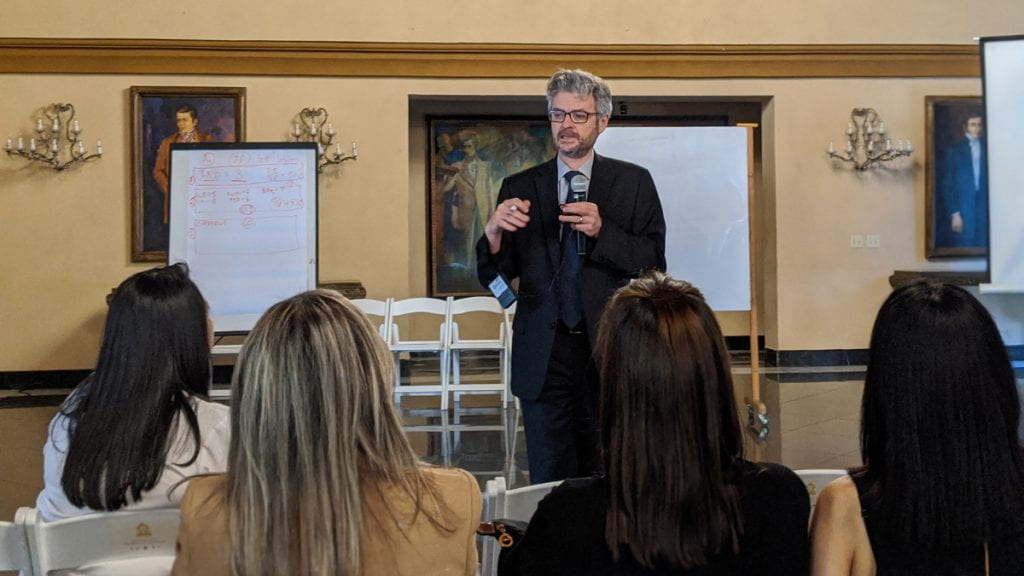Guest blog written by Catalina Riveros Gomez, Irina Cuesta Astroz, José Luis Bernal Mantilla, Juan Carlos Garzón-Vergara, Juan David Gelvez Ferreira. This is a team from Colombia working for an independent think tank called Fundación Ideas para la Paz (FIP). They successfully completed the 15-week Practice of PDIA online course that ended in December 2018. This is…Continue Reading Supporting lasting Peace in Colombia
Family Farming in Colombia
Guest blog written by Alejandro Rueda, and Sonia M This is a team from Colombia. They successfully completed the 15-week Practice of PDIA online course that ended in December 2018. This is their story. Throughout 15 weeks, our team was able to identify the causes behind our problem, to elaborate on them, to design strategies, to iterate,…Continue Reading Family Farming in Colombia
Higher Education Access in Ecuador
Guest blog by Daniela Espinosa Alarcón, Gabriela Suarez Buitron, Luis Fernando Ochoa, Verónica Villavicencio Pérez This is a team working at the National Secretariat of Higher Education and Technology in Ecuador. They successfully completed the 15-week Practice of PDIA online course that ended in December 2018. This is their story. Developing strategies based on identifying the…Continue Reading Higher Education Access in Ecuador
PDIA for Delivery Facilitation

written by Matt Andrews We at the Building State Capability program (BSC) have been working directly with governments for over a decade now; focused on helping agents in those governments build their capability to deliver for citizens and society. We are not consultants. We do not write purely academic papers, offer technical advice, or work…Continue Reading PDIA for Delivery Facilitation
Empowered to address the power problems in Honduras: A PDIA journey in progress

written by: Matt Andrews The energy sector in Honduras has a history of inefficiency. Financial and energy losses have festered for decades. Various reforms and interventions (often supported by external agents, like this World Bank project) have not solved the problem. In November 2018 a new unit in the President’s Office helped to mobilize a…Continue Reading Empowered to address the power problems in Honduras: A PDIA journey in progress
Stop, Look, and Listen! Preventing Recruitment of Youth into Illicit Activities in Southern Colombia
Guest blog written by Cameron Berkuti, Christina Schultz, Diana Acuña, Juan Pablo Castaño, Kelly Brooks, Susan Kemp This team successfully completed the 15-week Practice of PDIA online course that ended in December 2018. This is their story. As development practitioners, we tend to rush in with solutions to deal with complex problems. We impose so-called best practices…Continue Reading Stop, Look, and Listen! Preventing Recruitment of Youth into Illicit Activities in Southern Colombia
Team Soedalan’s PDIA Course Journey: High Maternal Mortality in Dominican Republic

Guest blog by Ana de Apraiz, Alberto Nuñez, Eduardo Gomez and Sofia Guillot Team Soedalan successfully completed the 15-week Practice of PDIA online course that ended in June 2018. They are a multidisciplinary team of development professionals with different backgrounds living in Spain. When we were asked to be part of the PDIA course sponsored by CID, most…Continue Reading Team Soedalan’s PDIA Course Journey: High Maternal Mortality in Dominican Republic
Using PDIA to Decode Growth in Honduras
From left to right: Jose Arocha, Matt Andrews, Marco Midence and Jorge Jimenez. Over the past 10 weeks, Matt Andrews has been working with a team of three mid-career students from Latin America on a project applying the problem analysis in PDIA to the challenge of growth in Honduras. We had shared their fishbone diagram in…Continue Reading Using PDIA to Decode Growth in Honduras
PDIA for growth in Honduras: A student project with major promise
written by Matt Andrews We at the Building State Capability program have the good fortune of working with amazing practitioners from all over the world, and on topics of real importance. This semester, for instance, I am working with a team of three mid-career students from Latin America on a project applying the problem analysis…Continue Reading PDIA for growth in Honduras: A student project with major promise
Finding the Fringes of Formality: Organizational Capability in Street-Level Bureaucracies in Brazil
Guest blog written by Susana Cordeiro Guerra Why is it that, despite the abundant resources invested and the largely favorable macroeconomic conditions that have prevailed until recently, middle-income countries have been unable to systematically deliver quality basic services, such as education and safety, to their citizens? Despite a wide variety of attempts to improve these crucial…Continue Reading Finding the Fringes of Formality: Organizational Capability in Street-Level Bureaucracies in Brazil